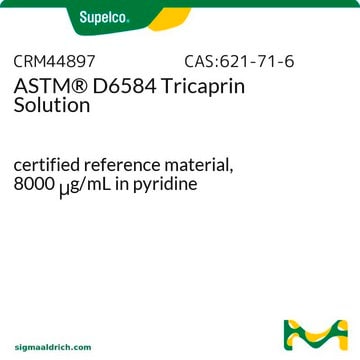N5377
Methyl nonadecanoate
≥98% (GC)
Synonym(s):
Nonadecanoic acid methyl ester
About This Item
Recommended Products
Quality Level
Assay
≥98% (GC)
form
powder
mp
37-40 °C (lit.)
functional group
ester
lipid type
saturated FAs
shipped in
dry ice
storage temp.
−20°C
SMILES string
CCCCCCCCCCCCCCCCCCC(=O)OC
InChI
1S/C20H40O2/c1-3-4-5-6-7-8-9-10-11-12-13-14-15-16-17-18-19-20(21)22-2/h3-19H2,1-2H3
InChI key
BDXAHSJUDUZLDU-UHFFFAOYSA-N
Looking for similar products? Visit Product Comparison Guide
Storage Class Code
11 - Combustible Solids
WGK
WGK 3
Flash Point(F)
Not applicable
Flash Point(C)
Not applicable
Personal Protective Equipment
Certificates of Analysis (COA)
Search for Certificates of Analysis (COA) by entering the products Lot/Batch Number. Lot and Batch Numbers can be found on a product’s label following the words ‘Lot’ or ‘Batch’.
Already Own This Product?
Find documentation for the products that you have recently purchased in the Document Library.
Customers Also Viewed
Protocols
Protocol for GC Analysis of Bacterial Acid Methyl Esters (BAMEs) on Equity®-1
Our team of scientists has experience in all areas of research including Life Science, Material Science, Chemical Synthesis, Chromatography, Analytical and many others.
Contact Technical Service














